Science and Faith
Audio Player
My Dad was a nuclear scientist at Aldermaston, the Atomic Weapons Establishment, working under the Official Secrets Act. So if a friend said, 'My Dad's a builder, what does yours do?', I just looked blank and said, 'I don't know.'
Dad was also not a Christian and never wanted to look into the claims of Jesus. And when I asked why, he said, 'Because science explains everything I need explaining, and I don't believe in anything science can't prove.'
And, to use the jargon, that was his 'worldview' – which means the fundamental belief through which you look at everything – like a pair of invisible glasses. So Dad looked at any talk of God and immediately thought, 'But God isn't real, because he can't be scientifically proven.'
And if you're a Christian talking to people about Jesus, or discussing an issue with them, you quickly run into different worldviews. So this is the first of three talks to help us engage with some of those worldviews. And this one's on Science and Faith.
Introduction: 'Hasn't science disproved God?'
I wonder if anyone has said that to you, or whether that's what you think – 'Hasn't science disproved God?' And there are two big areas where people think science has disproved God. One is the area of origins – where the universe came from and where we came from. And the other area is miracles – which the Bible presents as evidence for Jesus being God, whereas many would say, 'But science says miracles can't happen.' So let's look at each of those in turn.
1. Origins
And the current scientific theory about where the universe came from is the 'Big Bang'. I'm only a layman when it comes to this, and I understand that there is disagreement even over what 'Big Bang' theory says. But it includes the idea that the universe had a beginning, where all the matter in it was gathered in what they call a 'singularity', and then there was something like an explosion, sending stuff out in all directions to form stars and galaxies and so on.
And the first thing to say is that that's not in conflict with the Bible – because the Bible also says the universe had a beginning. So, Genesis 1.1 says:
In the beginning, God created the heavens and the earth [in other words, everything].
And Hebrews 11.3 says:
By faith we understand that the universe was created by the word of God, so that what is seen was not made out of things that are visible.
Which implies that God made everything out of nothing.
So the Bible says the universe had a beginning. So if (and I'm in no position to judge) the big bang theory is roughly right, it's just a stab at saying how God began it all. But what science can't do is say whether or not there is a God who began it all – because science is only a way of trying to understand what's observable.
So look at my first picture:
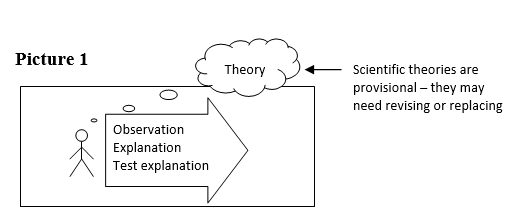
The stickperson stands for us. And the box stands for time and space where we live. And science is just a way, or method, of trying to understand what's out there in the observable world. And the arrow is the method.
So, for example, I was a biologist up to university level. And at one point I did a project on a species of stick insect. And science starts with observation – in the case of this stick insect, the observation, 'Doesn't it look well camouflaged on a green leaf?' But then you have to ask, 'But is it just coincidence that it's on a green leaf – or is the explanation that it's actually choosing a green leaf?' In other words, the theory that needed testing was the idea that this was camouflage behaviour. So then you have to test your explanation. So for weeks, I had stick insects in choice chambers that were half white and half green. An, overwhelmingly (and with good statistical significance) they chose green. Which confirmed my theory that they were actually making camouflage choices.
And that's all science is: it's just a method of arriving at theories of how bits of the observable world work. It's not a worldview that explains everything.
And by that first picture (Picture 1) I've put that scientific theories are provisional – they're just our best guess so far. So even the best theories will need revising. And some theories will need replacing. So for example, at one time, science believed that muscles worked by fluid pumping them up. Which, when you squeeze your biceps, seems believable. But that theory was wrong, and needed replacing. Just like some theories that are treated as 'gospel' today will be replaced (and looked back on with either laughter or horror).
So science is just a way of trying to understand what's observable. But God is not observable. He's not inside the box of time and space with us (although he's thoroughly involved with everything inside the box, as we'll see). And that means science can neither prove him or disprove him. In fact, God can only be known because he has revealed himself in time and space – above all in Jesus, his Son become man.
So look at my next picture:
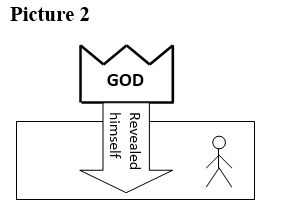
The crown stands for God, again – who is outside his creation, which is why we can't discover him with some super Hubble telescope. But the downward arrow stands for how God has revealed himself through all his words and actions recorded in the Bible – climaxing in his Son entering the box in the person of Jesus. And John 1.18 sums that up:
No one has ever seen God; but the only Son who is at the Father's side, he has made him known.
In other words, in Jesus, God made himself observable.
So one important thing to get from all that is that Christian faith is based on evidence that people really observed. And that needs saying because people often caricature faith as just choosing to believe in God, with no evidence, because you need to psychologically. So Richard Dawkins says:
Faith lacks all supporting evidence… but people need a crutch…
But in our reading from John's Gospel (20.24-31), we saw the exact opposite. We saw the risen Jesus giving sceptical Thomas evidence to believe in his resurrection from the dead. And John 20.30-31 says:
Now Jesus did many other signs in the presence of the disciples, which are not written in this book; but these are written [as evidence] so that you may believe that Jesus is the Christ, the Son of God, and that by believing you may have life in his name.
So, sadly, I think my Dad was actually being unscientific when he refused to look at the evidence of the Gospels.
And the other important thing to get is that when scientists talk about God, they're not making scientific statements, but personal statements. So for example, Stephen Hawking was Lucasion Professor of Maths at Cambridge, and a brilliant scientist. And he said,
There is no God. [And] I regard the brain as a computer which will stop working when its components fail. And there is no heaven or afterlife for broken down computers; that's a fairy story for people afraid of the dark.
And the mistake people made was to give those statements the same weight as his scientific statements – as if being an expert on gravity makes you an expert on God. But since science is only a way of trying to understand what's observable, and since God is not observable by science, Stephen Hawking had no more authority when talking about God than you or me.
Let me recommend this new book by John Lennox, Can Science Explain Everything?, which is probably the best, easy read on this. And in it, Lennox quotes a non-Christian, Nobel-prize winning scientist who was critical of people like Stephen Hawking making pronouncements about God. He said:
Remember: outside his or her own field of expertise, the scientist is just as dumb as the next guy.
(Do you think he was American? He was.)
Let's move on to the other origins issue – which is: where did life come from? So that brings us to the theory of evolution – which is that all species of living creatures developed from a single ancestor by random, chance processes.
And that's been called 'A Theory In Crisis' – in the title of a book, Evolution: A Theory In Crisis, which was written 35 years ago by Michael Denton, who is a world-class molecular biologist. And he's just published a revised edition called Evolution: Still A Theory In Crisis. And he basically says: the theory of evolution is a believable story – the story that first of all chemicals (in other words non-life) got together in the primeval soup, and that by chance, they assembled into the first cell – in other words, life, and that from that single life form, all species including ourselves have developed. It's a believable story – a bit like a visiting Martian might, at first sight, find it believable that Ford Fiestas grew into Ford Focuses, which grew into Ford S-Maxes. But Michael Denton shows that there's still no evidence for how the step from non-life to life could possibly have taken place, and that there's still no evidence that species have changed into other species. So he would say it's a theory that needs replacing. And he speaks for a significant number of dissenters in the scientific community.
So personally, I doubt the theory of evolution, so I don't spend time working out how it might fit with the Bible.
And if you want more on the origin of life issue, I suggest John Lennox's more detailed book, God's Undertaker: Has Science Buried God?, where he shows up the holes in the theory of evolution, but also shows how the Bible worldview makes better sense of things. For example, it makes better sense of DNA – the massive library of genetic information in every living cell. Because scientists agree that computer systems can't create information – it has to be inputted by a person, because information comes from intelligence. And so you can argue that the information in DNA points to a personal intelligence who put it there.
That's Origins. More briefly, let's think about:
2. Miracles
Let me read John 20.30-31 again:
Now Jesus did many other signs [in other words, miracles which were signposts pointing to who he really was] in the presence of the disciples, which are not written in this book; but these are written so that you may believe that Jesus is the Christ, the Son of God, and that by believing you may have life in his name.
So the four Gospels present Jesus' miracles as part of the evidence for him being God. But lots of people would say, 'Science says miracles can't happen, because we live in a closed system of cause and effect, governed by laws of nature, that can't be interrupted.' So my next picture tries to show that worldview:
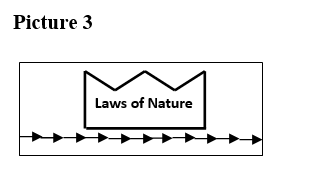
So the box stands for time and space, again. And the arrows stand for the long chain of cause and effect, kicked off by the big bang. And this worldview says: all of that is governed by the laws of nature. For example, the law of gravity, which means that whenever I drop something it'll fall towards the centre of the Earth, and whenever I try to walk on water, I'll sink. And no-one can ever be an exception to that. So now listen to John 6.16f:
When evening came, his disciples went down to the sea, got into a boat, and started across the sea to Capernaum. It was now dark, and Jesus had not yet come to them. The sea became rough because a strong wind was blowing. When they had rowed about three or four miles, they saw Jesus walking on the sea and coming near the boat, and they were frightened. But he said to them, 'It is I; do not be afraid.
And someone with this closed system worldview will say, 'That never happened. Because it can't have happened.' And you can give them the best book there is on the historical reliability of John's Gospel (about how John was an eyewitness, and close to the events, and wrote this himself, and so on) but they will stay say, 'It can't have happened' – because you're not up against the issue of what's historically reliable; you're really up against a worldview clash.
But if the God of the Bible is really there, that closed system worldview is wrong, because the universe didn't just kick off by chance as a chain of cause and effect with no-one behind it. Instead, God created the universe and governs it every moment – which is why it's so regular and orderly, and why we can talk about 'laws of nature'. So that's my next picture:
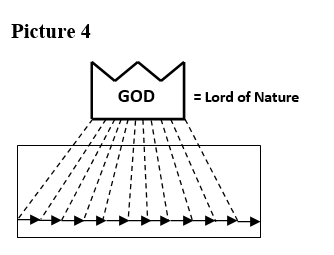
So there is God outside his creation. And, inside the box, we can see all sorts of chains of cause and effect. But every one of them is under God's moment-by-moment control. So it's not the laws of nature that are in charge but the Lord of nature. And it's because he controls things so regularly, that we can observe them happening so regularly, and turn our observations into what we call 'the laws of nature.' But it's not the laws that are in charge, but the Lord.
So it's a bit like our dog, Bramble, watching the post fall through the letterbox at 9.30am each morning. From her point of view, inside the house, she just sees the post hitting the mat regularly at 9.30am every day. And she might, in her doggy way, call that 'the law of the post'. But it's not the 'law of the post' that makes the letters come through the letterbox, but the postman doing what he does so regularly. And, likewise, with the universe, it's not 'the laws of nature' that makes everything happen, but the Lord of nature, the Creator God. And I've tried to show God's moment-by-moment involvement and control by those dotted lines in Picture 4.
And the Bible teaches that worldview in Hebrews 1, which says:
Long ago, at many times and in many ways, God spoke to our fathers by the prophets [that's how he made himself known in Old Testament times], but in these last days he has spoken to us by his Son [he's actually made himself observable in Jesus], whom he appointed the heir of all things, through whom also he created the world. He [Jesus, God's Son] is the radiance of the glory of God and the exact imprint of his nature, and he upholds the universe by the word of his power.
In other words, Jesus. God's Son, is sustaining the universe and directing it every moment. And that's why gravity is operating right now, so that everything doesn't just fly apart. It's because he's keeping it operating.
So if you're not yet a Christian – or you're talking about this to someone who's not yet a Christian – here's the big, 'What if…?': What if… the God of the Bible is really there? And what if… he does have a Son who shares his nature and his Lordship over everything? And what if… his Son did become human and entered the box of time and space – like in this last picture:
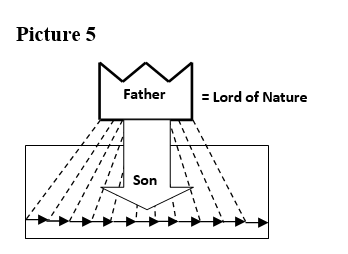
And what if… when he was inside the box, he showed who he was by showing his Lordship over nature? Because then, walking on water wouldn't be Jesus (naughtily) 'breaking the law of gravity'. It would just be Jesus doing what he's always doing – namely, controlling gravity, because he's the Lord of gravity, he's above gravity or outside gravity (however you want to put it).
Or what about the calming of the storm? Mark 4 says:
And a great windstorm arose, and the waves were breaking into the boat, so that the boat was already filling. But [Jesus] was in the stern, asleep on the cushion. And they woke him and said to him, 'Teacher, do you not care that we are perishing?' And he awoke and rebuked the wind and said to the sea, 'Peace! Be still!' And the wind ceased, and there was a great calm.
And that wasn't Jesus 'breaking the laws of meteorology', because the laws of meteorology are just our way of talking about what Jesus is doing all the time, controlling every weather system everywhere. So all he was doing in Mark 4 was using his control to do what he usually does, but to a different timescale – stopping wind and waves instantly – as a signpost to point to who he really was. Which is why, Mark 4.40:
He said to them, 'Why are you so afraid? Have you still no faith?' And they were filled with great fear and said to one another, 'Who then is this, that even the wind and the sea obey him?
So if you're looking into Christianity, that's one question you need to answer: 'Who is this?' Was Jesus really God's Son become human? Is Jesus really the Lord of everything – in which case, if the wind and sea obey him, how much more should you and I obey him and live the way he tells us to?
But the other question is this: if Jesus really is God's Son, why did he end up dying on a cross? Why would the Lord of everything – of life, of gravity, of people, of wood, of nails, die like that, lose control over all those things like that? And the Bible's answer is: he never lost control, and dying on the cross is the whole reason he entered the box in the first place. Because Jesus said in Mark 10.45:
I came… to give my life as a ransom for many.
Because we didn't just need him to show us God, but to pay the price of our forgiveness back into relationship with God. And so on the cross, he took the judgment for everything we'll ever do wrong, and then rose again. So that we can come to him now and say, 'Please forgive me that I haven't treated you as Lord. And please help me to live for you as my Lord from now on.'
And maybe that's why my Dad – who was a scientist to his fingertips – wasn't scientific enough to look into the claims of Jesus. Because maybe he had an inkling that if you test the explanation that Jesus is God's Son, it could lead you not just to a theory, but to the Person who deserves to be running your life. And that's the catch in all this, isn't it?
So if you're still thinking through what you believe, can I encourage you to be scientific, and look at Jesus in one of the Gospel records about him. You can take a free copy of Mark's Gospel from the Welcome Desk or from the stands at the doors, and a free copy of this booklet Why Jesus? And if there's a specific question or objection in your mind, you'll find someone in the Resources Area at the back who can suggest a booklet or book.
And if you are a Christian, I hope that's got your thinking clearer. And I hope it's given you things to say in answer to questions – although, of course, you need to put it in your own words and way.
